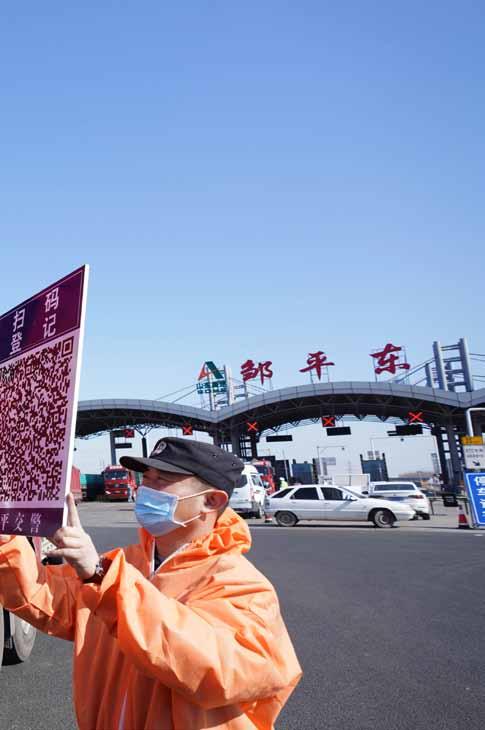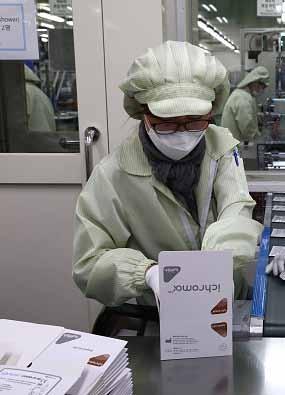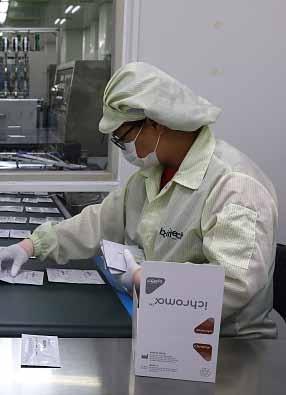
14 minute read
Can You Catch the Coronavirus Twice
Conflicting Reports on Coronavirus Relapses Raise Concerns Over Lockdown Alleviations
A driver scans a QR code of a local app to track personal data for the COVID19- containment in Zouping in east China›s Shandong province Tuesday, Feb. 2020 ,18. (Getty)

However, as several countries are now drawing up plans to ease lockdown measures, the question of whether or not people can develop immunity from the virus will need to be addressed sooner rather than later.
HOW IMMUNITY FROM VIRUSES IS BUILT
Viral immunity is a bit of a finicky phenomenon. For some reason, our bodies can build long life immunities to some viruses, while they struggle to do the same for other viruses. If a human is infected with the chickenpox once, he or she will never catch again during their lifetimes. Nevertheless, our immune systems have trouble with other viruses, for instance influenza A viruses have a high rate of reinfection.
by Ali El Shamy On February 2020 ,27, some news reports emerged that a woman in Osaka, Japan had tested positive for Coronavirus for a second time after seemingly making a full recovery. Naturally, this raised concerns over whether or not people can get re-infected with the virus, thereby implying that the world might be in for a long battle with COVID19-. Since then, few reports have indicated that the Coronavirus has a high reinfection rate, having said that there is still much we don’t know about this new virus and for the past few weeks governments have been preoccupied with reducing the spread of the virus, while scientists have been busy trying to find treatments and/or a vaccine for the virus. When a virus enters the body, two processes occur. The first process is carried our by innate response mechanism of the immune system, which produces macrophages, neutrophils, and dendritic cells to slow down the viruses spread in the body. This innate mechanism is non-specific and will be triggered once any virus is detected, moreover it might even be successful in stopping infected people from developing symptoms associated with the virus. A problem with this innate response is that it doesn’t ensure future immunity from the virus. The second mechanism that comes after this process is the adaptive response, which develops antibodies that will bind to the virus and fight it, and T-cells might even be produced to eliminate
eport R
cells that are infected with the virus. If the adaptive response is strong enough, then it will have built a lasting “memory” that will enable our immune systems to quickly recognise and destroy the virus should it re-enter the body. This adaptive response is not a quick process, according to a science report published in the BBC; it can take up to 10 days for our immune systems to produce the anti-bodies against the virus. Furthermore, evidence has shown that the patients who have recovered from bad cases of the virus are the ones who develop the strongest immune response against it. Not enough evidence sufficiently demonstrates that a recovered patient who only showed mild symptoms has built a similar robust immune response.

IMMUNITY PASSPORTS: AN ABSURD IDEA IN THE MAKING
Earlier in the year, the British government attempted to tackle the pandemic through a strategy of herd immunity. Herd immunity was seen an alternative strategy that would help keep the economy moving despite the pandemic. However, after it became evident that the strategy would have a devastating toll on human life the government made a U-turn and implemented lockdown measures in a matter of days. As of the writing of this piece, the only other major Western state that is following the herd immunity strategy is Sweden. While the idea of herd immunity might have seemed scientifically sound on paper, it did raise many ethical questions as it made it seem like governments were treating the pandemic as a controlled lab experiment rather than a crisis that is costing human lives.
Tough the strategy of herd immunity has for the time being been shelved, there is a new idea floating around that is based on the idea that some people have built an immune response to the virus. As part of their plans to loosen social distancing measures and reopen their economies, some governments are considering issuing “immunity passports” or “immunity certificates” to those who have recovered from the coronavirus. Those with the certificates would be allowed to go back to work, since, in theory, he or she would not be at risk of reinfection.
Employees work on the production line of the Ichroma Covid19- Ab testing kit used in diagnosing the coronavirus (COVID19-) at the Boditech Med Inc. headquarters on April 2020 ,17 in Chuncheon, South Korea. (Getty)

While this seems like a good way of easing lockdown measures, some have raised concerns over individual privacy. For instance, the health apps in China ask users to provide them with contact details, passport information and medical certification. The apps also store a person’s travel history, to indicate if they have travelled to a COVID19- hotspot or if they may have been in contact with a person who has contracted the virus. Some users have also complained over the lack of transparency of how the apps work and asked what kind of user information it stores.
WOULD IMMUNITY PASSPORTS WORK In China, where the virus originated from, authorities have issued phone apps that can be seen a prototype form of immunity passports. In the apps, individuals are given different QR codes that are colour coded. People who are assessed to be healthy are given a green QR code, which enables them to travel freely within the province. Yellow QR codes mean that the person may have come in contact with someone infected with the virus, while a red code means that they are sick with the virus. People who are given yellow QR codes need to self-quarantine, while those with red QR codes need to undergo supervised quarantines. The app is now being used in more than 200 Chinese cities, and it is being rolled out to the rest of the country. There is also the second question of whether or not people actually build immunity to the virus in the first place? As the novel Coronavirus is still a new virus, there is still much scientists don’t know about how it behaves. Earlier in April, the Korean Centres for Disease Control and Prevention reported 260 “relapsed” cases of Coronavirus, which again raised questions over COVID19- immunity. However, by the end of the month Korean scientists refuted the prospects of Coronavirus relapse, stating that recovered patients were testing positive again because the tests “were picking up dead virus fragments”, thus giving false positives. As such, those people had fragments of the virus, but weren’t actually sick. Nevertheless, once news broke out that governments were considering “immunity passports”, the World Health Organization warned against the idea as it stated that there still wasn’t enough evidence demonstrating that people can’t be infected again with the virus.
Hezbollah is on the Verge of Having Complete Hegemony over Lebanon pinion o
by Alia Mansour
Over the past two decades, Hezbollah has been actively enforcing its hegemonic rule over Lebanon. Its journey to become the sole ruler of Lebanon began with the UN Security Council Resolution 1559, which was adopted in summer 2004. The Resolution called for the disarmament of all militias within Lebanon, supported the Government of Lebanon’s full sovereignty and authority over Lebanon, called for the withdrawal of foreign forces and called for free elections conducted according to the Lebanese constitution and without the inference of any foreign interference or influence. In spite of these stipulations, it soon became clear that the country would face harrowing times. A few months later, former Prime Minister Rafic El Harriri was assassinated. A number of Lebanese politicians would face similar fates, while continuous terrorist attacks would disrupt the daily lives of Lebanese civilians. International pressure and grassroots campaigns persuaded the Assad regime in Damascus to withdraw its forces from Lebanon, this would provide Hezbollah with the freedom to manoeuvre and start its take over project. Eventually, it would slowly but surely take full control of the political institutions within the Lebanese state.
In July 2006, Hezbollah would go to war with Israel a war that would take a heavy toll on the Lebanese economy. To this day, Lebanon is still suffering from the economic costs of the war. Whenever said costs are brought up, Hassan Nasrallah, always gives his famous reply “if I only knew” implying that he would have never went through with the war had he known how it would impact the economy. Soon after UN Security Council Resolution 1707, Israel stopped its attacks and Hezbollah started moving towards central Lebanon after previously only being confined at its headquarters in Southern Lebanon. In May 2008, Hezbollah’s militias would occupy Beirut and Mount Lebanon in protest of Prime Minister Fouad Siniora’s decisions to dismiss the head of the airport security apparatus, Brigadier General Wafik Choucair, and dismantle Hezbollah’s telecommunications network. In spite of using brute force, the group could not get all the power it desired. As such, it exploited the political deadlock in Lebanon to get more provisions during the Lebanese National Dialogue Conference was held in Doha between 16 May and 21 May 2008. These talks resulted in the Doha Agreement, in which Hezbollah stipulated that it would withdraw forces in Beirut and Mount Lebanon provided that a neutral independent candidate is elected president of Lebanon, a tripartite government (consisting of 16 cabinet members, 11 opposition members and three members nominated by the president) is formed, and most importantly said opposition would have the power to veto any decision made by the governing cabinet. As most of the opposition at the time was allied with Hezbollah, the agreement effectively gave the group the power to control the government’s decisions.
As usual, Hezbollah didn’t keep its end of the deal as its ministers as well as the ministers from the Free Patriotic Movement and the Amal Movement all resigned from their posts. This resulted in the collapse of Saad El Hariri’s government since 1/3 of its ministers handed in their resignations. Subsequently, Hezbollah militias stormed Beirut and began attacking civilians and members of parliament, moreover the group refused to endorse Najib Mikati as Prime Minister.
This wouldn’t be the last time in which Hezbollah caused a political deadlock, in 2014 Michel Soluieman’s tenure as president ended. As such, it came time for the parliament to vote for a new president, but Hezbollah would come in the way of the proceedings in order to ensure that its ally, Michel Aoun, was chosen for the post. After two years of political upheavel, Hezbollah got its way and Aoun became the new President of Lebanon.
The President’s office wasn’t enough for Hezbollah, as it was an ardent supporter of the “my way, or the high way” philisophy. Hezbollah members and allies already made up a third of the governing body, but that wasn’t enough for the group which wanted more control over the Council of Ministers. To achieve this goal, Hezbollah introduced a new electoral law based on propertional representation which resulted in more Hezbollah and Hezbollah-allied politicians getting elected into the council. The reason Hezbollah was able to introduce new electoral laws is twofold, first some of the group’s opponents were naïve towards the implications the new law would have and second other opponents were afraid
of Hezbollah’s threats of not holding elections at all if its rules aren’t put in place.
Recently, a pro-Hezbollah government came into power with the ascension of Hassan Diab as Prime Minister. As such, Hezbollah is now in full control of the three branches that make up the Lebanese government, and as it stands the only sectors that remain out of the group’s grip is Lebanon’s free economy and banking sector.
Hezbollah has exploited the October 17 Uprising and the country’s poor economic and living conditions as an impetus to battle the banking sector head on. It should be noted that Hezbollah’s fight against the banks didn’t happen overnight, as it has for years been taking measures to tame them and make them a weaker institution. Currently, Lebanese banks are taking stringent measures at the expense of civilians, and of course Hezbollah is tacitly approving of such measures.
Up until 2016, Hezbollah has been on an ongoing conflict with the banking sector, particulalry the central bank and its leader Riad Salameh. At the end of 2015, former US President Barack Obama signed in a new law which extended sanctions that would reduce funding for Hezbollah’s terrorist activities. The law enforced sanctions on any foreign monetary institution (such as banks) from funding the group or laundering money to Hezbollah. Soon after, the head of the Lebanese central bank announced that it would comply with the US’s new law, and would place sanctions on one hundred institutions and individuals associated with Hezbollah. tackle the banks’ monopoly over their money.
Afterwards, Hezbollah did a ferocious media campaign against the banking sector. Due to the woeful economic conditions in Lebanon, the campaign succeeded in rallying people against the sector. As a matter of fact, many of those who oppose Hezbollah joined the rallying calls against banks.
Many political and banking sources have recently warned against Hezbollah’s plans to takeover the country’s economic apparatus, just as it recently did with both the political and security apparatuses, respectively. There have been several signs of a Hezbollah takeover of the economy, for instance the scarcity of US dollars in the market has caused most commercial establishments to cease their operations. This is because they no longer have the liquidity needed to import and export goods. Moreover, these firms find themselves unable to carry out operations based on bank transfers and credits. Hezbollah has exploited this by importing Syrian and Iranian goods across illegal border crossings, these goods are given to merchants who are tied to the group. As a result, Hezbollah is able to sell goods and products in the market without any competition from other merchants or businesses. In doing so, Hezbollah addresses its funding troubles since now they can circumvent sanctions, which prevented it from gaining funding from banks and businesses. At the same time, the group has created a demand for Iranian and Syrian goods, which is beneficial to both the Iranian and Syrian regime as they now have a means of bypassing sanctions.
A few days later Hezbollah bombed the headquarters of BLOM Bank. The operation was not meant to cause any casualties and was instead meant as a warning against these sanctions, and BLOM Bank was targetted since it was the first bank to implement the new US law. Today, Hezbollah is pushing the banking sector towards its policies. For instance, it persuaded the current Diab government to suspend payments of its Eurobond debt; the government took this decision without consulting the creditors of the debt. The government would also go on to refuse working with the International Monetary Fund to find ways out of the crisis, “We will not accept submitting to (imperialist) tools ... meaning we do not accept submitting to the International Monetary Fund to manage the crisis,” Hezbollah deputy leader Naim Qassem said. Hezbollah MP Hassan Fadlallah would go on to say that the group’s position “is not toward the Fund as an international financial institution but on the terms offered to Lebanon.” He then emphasized that the group was doing this for the good of the people, as it sought to It should be noted that Hezbollah has always been receiving funding from Iran. According to the Sanctions and Illicit Finance Centre at the Foundation for the Defence of Democracies (FDD), Iran has been transferring bags filled with money to Hezbollah via Syria. The group also gets funding through its illicit activities, or from its supporters in Africa who also transfer cash in luggage, which aren’t searched since Hezbollah controls all the airports in Lebanon. Hezbollah is currently exploiting peoples’ economic misery to rally them against the banking sector. However, it is Hezbollah that was the main cause of the current economic crisis. Its calls against the banks are not for the benefit of the people, but rather the benefit of its hegemony over the country. Over the years, no unified opposition force has been able to halt Hezbollah’s quest for unchallenged power. It is now only a matter of time until Hezbollah has full control over Lebanon, and by that time the country’s ruling body will be fully committed to the Islamic Republic of Iran.





